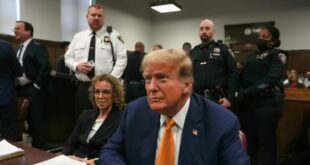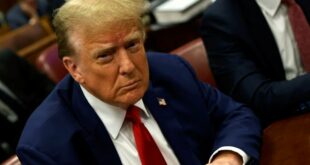Charges detail Trump's behind-the-scenes instructions to his VP Mike Pence and others
An epochal moment in American history has now produced another involving Donald Trump's unprecedented role, in an unprecedented event.
The storming of the U.S. Capitol, on Jan. 6, 2021, in a mob attempt to undo an election result, has resulted in charges against the former president.
One need only look at Trump's strong score in recent opinion polls to draw skepticism that any of this makes a difference, that it weakens him in any way.
After all, these aren't the first charges against Trump. That happened in New York, where the state indicted him over hidden payments to Stormy Daniels.
And these arguably aren't the most legally perilous cases. The charges involving his alleged hoarding, showing off and lying about classified documents carry longer prison penalties.
But these are very likely the most politically significant.
This case involves the most elemental functioning of American elections, right as the country embarks on a new election, with Trump a serious contender.
Special counsel Jack Smith sought to underscore the gravity as he unsealed a four-count indictment for conspiracy to defraud the United States, conspiracy to obstruct an official proceeding, conspiracy against rights, and obstruction.
"An unprecedented assault on the seat of American democracy," is how Smith described the events of Jan. 6, 2021.
"It was fuelled by lies. Lies by the defendant."
That famous defendant is scheduled to appear in a Washington, D.C., courtroom, on Thursday afternoon.
One of the more attention-grabbing details of the 45-page charge sheet is the news that former Vice-President Mike Pence was taking notes as Trump pressed him, repeatedly, to overturn the results of the 2020 election.
Trump to Pence: 'You're too honest'
Trump fumed at Pence's refusal to do so and told him, on Jan. 1, 2021, according to the indictment: "You're too honest."
In another exchange involving Pence on Jan. 4, Trump's own lawyer allegedly told him his plans were impossible.
Trump allegedly replied: "That's okay, I prefer the other suggestion," meaning the idea that Pence could cancel the election certification.
The indictment contains many such anecdotes.
Here's why that matters. Trump's legal defence will rest on his right, as a citizen, to contest, to complain about, an election result he insists was unfair.
Trump's lawyer foreshadowed this line of argument.
"He's being indicted for free speech," Trump lawyer John Lauro told Fox News on Tuesday night. "He's being indicted for objecting to the way the 2020 election was carried out."
Key to this case: Trump's state of mind
The prosecution will argue there's one thing that neither Trump, nor any American citizen, has a right to do: knowingly perpetuate a fraud.
The case turns on Trump's state of mind. On whether he knew the election was lost, and continued insisting it wasn't.
The indictment argues Trump knew, or should have known.

Former president Trump receives four-count indictment
Special counsel Jack Smith announced former U.S. president Donald Trump is being charged with conspiring to defraud the United States, among other charges.
It catalogs an exhaustive list of people who told the president it was over and that Biden had been elected president.
They include Trump's campaign attorneys; his attorney general and assistant attorney general; Republican election officials in Georgia and elsewhere; Michigan congressional Republicans; his campaign staff; his vice-president; top U.S. intelligence and cybersecurity officials; White House lawyers; a senior campaign adviser who warned that none of his wild claims of fraud could be backed up.
"You can see why we're 0 to 32 on our cases," that advisor allegedly told him. His campaign lawyers even admitted in court, in Arizona on Nov. 13, 2020, that he'd lost.
In fact, Trump allegedly admitted it too, to military brass.
On Jan. 3, 2021, while discussing an unspecified foreign issue, the indictment says Trump told his military leadership he'd let Biden handle the issue, after the transfer in power 17 days away: "It's too late for us. We're going to leave that to the next guy."
But it didn't matter.
According to the indictment, Trump went straight from that meeting, into another one — with his alleged co-conspirators.
The indictment lists six co-conspirators, for whom no charges have been announced. Based on their description, one is former New York City mayor Rudy Giuliani.
It went on and on like that.
When his acting attorney general and deputy attorney general refuted some of his claims and told him it wouldn't change the result, Trump allegedly replied:
"Just say that the election was corrupt. Leave the rest to me and the Republican congressmen."
A former Trump White House staffer-turned-Trump-critic responded to the indictment by vouching for its core thesis. Alyssah Farah said on CNN: "I can include myself in that. He shared with me that he knew he lost."
Trump, she predicted, is going to loathe this case.
"Frankly, pleading ignorance and stupidity is going to be his best defence," Farah said.
"He's going to hate that."
Trump likens charge to Nazi persecution
We'll see.
Trump certainly hated being indicted. In a statement, he called these charges political persecution, with comparisons to Nazi Germany and the former Soviet Union.
But there's no indication his presidential run has suffered, so far.
Trump is dominating the Republican field to such an extent that it's hard to see how any one candidate could assemble enough votes to defeat him for the party nomination, let alone a fractured field including nearly a dozen also-ran candidates.
Then, assuming he's the nominee, it's on to the general election.
An election that will play out with Trump facing trials in at least three different jurisdictions, and possibly a fourth, if he's charged in Georgia.
General election polls currently show him in or near a statistical tie with Biden. At this point, four years ago, polls had Biden trouncing Trump. The election wound up being a nail-biter in several swing states, with a margin of less than 0.5 percentage points in three critical states.

Trump polls far ahead of Republican rivals, despite legal troubles
Donald Trump is now polling with more than twice the support of his challengers, as some Republicans are outraged over his growing legal troubles.
All this means Trump could be president again.
And now, this new case will become an issue in the 2024 election. Namely: If Trump wins, will he try to cancel these prosecutions?
And attempt another unprecedented act: Pardoning himself.
ABOUT THE AUTHOR
Alexander Panetta is a Washington-based correspondent for CBC News who has covered American politics and Canada-U.S. issues since 2013. He previously worked in Ottawa, Quebec City and internationally, reporting on politics, conflict, disaster and the Montreal Expos.
*****
Credit belongs to : www.cbc.ca
 MaharlikaNews | Canada Leading Online Filipino Newspaper Portal The No. 1 most engaged information website for Filipino – Canadian in Canada. MaharlikaNews.com received almost a quarter a million visitors in 2020.
MaharlikaNews | Canada Leading Online Filipino Newspaper Portal The No. 1 most engaged information website for Filipino – Canadian in Canada. MaharlikaNews.com received almost a quarter a million visitors in 2020.








